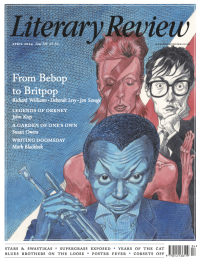Richard Vinen
Two Spads on a Train
England: Seven Myths That Changed a Country and How to Set Them Straight
By Tom Baldwin & Marc Stears
Bloomsbury 346pp £22
There is a tradition of authors setting out to ‘discover’ England and writing books about what they find. Such works were particularly common between the wars. H V Morton published In Search of England in 1927; J B Priestley’s English Journey came out in 1934. Orwell’s Down and Out in Paris and London (1933) and The Road to Wigan Pier (1937) belong to the same genre. Of course, such writing is always contrived. No author sets out with an open mind. They already know what they are going to find before they book their ticket – not least because they have explained it to their publisher over lunch in Soho.
In their new book Tom Baldwin and Marc Stears write about visiting seven places: Runnymede in what used to be rural Surrey, Plymouth, Hull, Wolverhampton, Greenwich, Blackpool and Oxford. Each place is described in terms of its association with some individual or event, which, in turn, is treated as a starting point for the discussion of a ‘myth’. Thus Runnymede goes with Magna Carta and the myth that the British ‘invented liberty’. Plymouth goes with Sir Francis Drake and the myth of Britain as a buccaneering global power. Hull goes with William Wilberforce and the campaign against the slave trade – and also with the myth that Britain is qualified to give moral lessons to the rest of the world.
It is not always clear how long the authors have spent in the various places that they dissect, though they have obviously spent a large part of their lives in Oxford. One sometimes suspects that they might have arrived at their chosen destinations on the early train from Euston and

Sign Up to our newsletter
Receive free articles, highlights from the archive, news, details of prizes, and much more.@Lit_Review
Follow Literary Review on Twitter
Twitter Feed
'A charming and amusing personal history'
Don't miss this brilliant @Lit_Review review of #WorldCupFever 👇
@KuperSimon's must-read footballing journey in nine tournaments is out now ⚽️🏆
Michael Taylor - The Beautiful Game
Michael Taylor: The Beautiful Game - World Cup Fever: A Footballing Journey in Nine Tournaments by Simon Kuper; Th...
literaryreview.co.uk
In the summer of 1918, the Caspian port of Baku played host to a remarkable group of Allied soldiers, sent to defend oil wells against the Ottomans.
Anna Reid recounts their escapades.
Anna Reid - Mission Impossible
Anna Reid: Mission Impossible - Mavericks: Empire, Oil, Revolution and the Forgotten Battle of World War One by Nick Higham
literaryreview.co.uk
Alfred, Lord Tennyson is practically a byword for old-fashioned Victorian grandeur, rarely pictured without a cravat and a serious beard.
Seamus Perry tries to picture him as a younger man.
Seamus Perry - Before the Beard
Seamus Perry: Before the Beard - The Boundless Deep: Young Tennyson, Science, and the Crisis of Belief by Richard Holmes
literaryreview.co.uk